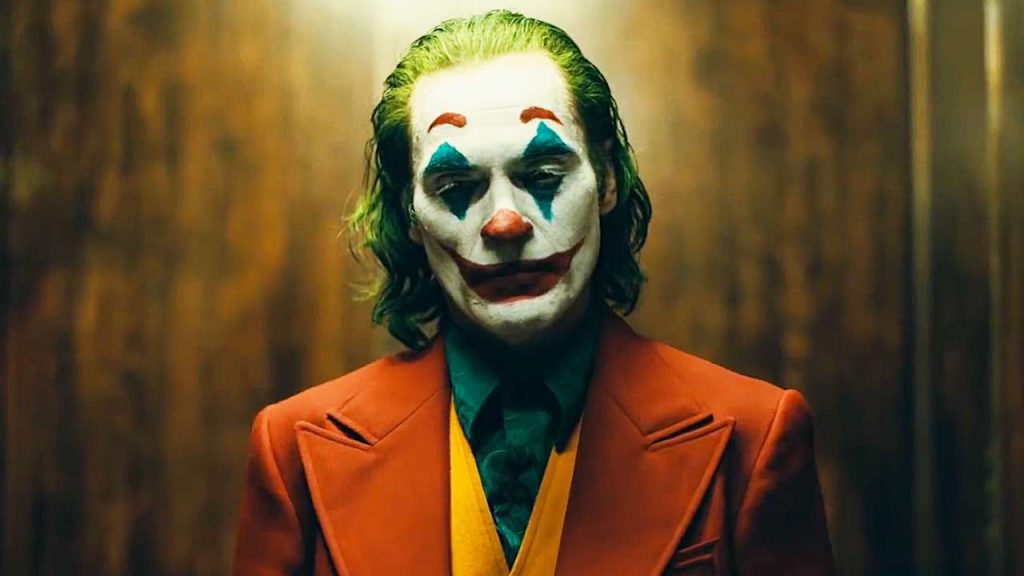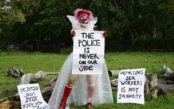[dropcap style=”font-size:100px;color:#992211;”]T[/dropcap]he film is an origin story for the popular DC villain and Joker has polarised critics and audiences, experiencing waves of plaudits as well as criticism; some of the most seasoned film experts have been immobilised by hedging, while others have made outright attacks on its premise and quality.
This review could be seen as belonging to the ‘backlash against the backlash’, as Mark Kermode has referred to the recent reassertion of Joker as a masterpiece. Further to this I would see it as an indictment of the critics who are wrongheaded or worse manipulative in the ways they are trying to manufacture consent to their interpretation.
This Review Includes Significant Spoilers! (Watch the Film First)
In particular I felt inspired by the Guardian’s review by Peter Bradshaw who declared the film an outright failure, the ‘most’ disappointing of 2019 awarding it two stars. There he claims it as burdened down by its references to other films and as superficial and overly serious. His candour taking on the tone of the bullies that beset Fleck himself ‘Joaquin Phoenix plays Arthur Fleck, a pathetic loser and loner’ (Bradshaw 2019) further judging Fleck’s mentally ill mother’s home as ‘Scuzzy’.
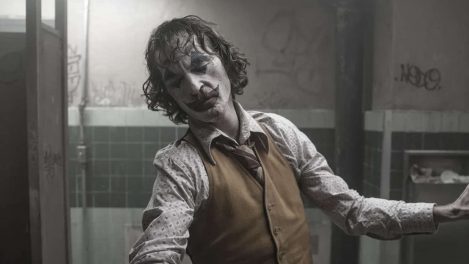
Fleck’s metamorphosis is symbolised physically by his preformative and cathartic dance.
This does not endear Bradshaw; alternatively I picked up on Fleck’s care giving (prioritising his mother’s nourishment over his own and bathing her as care givers are prone to do). His desire however naively to spread ‘joy and happiness’ and his simple longing to have a connection with a father figure:- first the selfish Murray Franklin later the remote Thomas Wayne or intimacy with a partner, in the form of the single mother who lives along the corridor of his high rise, we might add to this his ultimate betrayal by every single character and his history of abandonment, violent child abuse and alienation.
The King of Comedy
These factors, even taking into account his later fall into psychosis made me very uncomfortable with Bradshaw’s seemingly indifferent and sarcastic reading ‘Poor Arthur has a neurological condition that means he is liable to break into screeching laughter at inopportune moments.’ (Bradshaw 2019).
As for the references to other films this is done masterfully and gives the film a layer of meaning and history which contrasts the idealistic Fleck with the narcissistic Rupert Pupkin (Robert De Niro) of Martin Scorsese’s 1982 The King of Comedy.
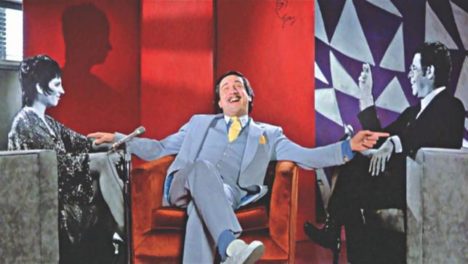
Rupert Pupkin (De niro) practices with imaginary guests in Scorsese’s 1982 King of Comedy.
Mark Kermode is right to see De Niro’s presenter Murray Franklin in Joker as Pupkin years later, but wrong to see Fleck as the same kind of animal. Fleck is most successful making children laugh on the bus and in the hospital, his motivations to be on the television are fueled by the experience of watching and escaping to that world when he settles down to enjoy it with his mother; rare moments of comfort. Fleck’s repeated desire to ‘spread joy and happiness’ make him seem in part childlike by contrast Pupkin who is ultimately successful in the close of King of Comedy and in the end just wants to be another:- Murray Franklin.
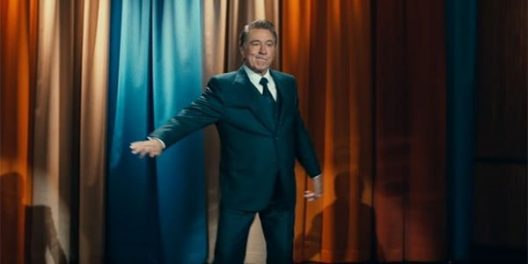
Robert De Niro as the glib chat show host Murray Franklin (YouTube still 2019)
Set in 1981 against a background of poverty and decaying neighbourhoods, Joker sees the labyrinthine Gotham City with its monumental Ballardian alienation and sharp contrasts between rich and poor as the uncomfortably familiar context for Arthur Fleck’s abjection, dehumanisation and final decent into psychosis.
A Physical & Emotional Performance Recalls Chaplinesque Pathos
Joaquin Phoenix as Fleck gives a masterful and potent performance and he is sure, despite controversy to receive awards for the effort. The dramatic scenes are played with fantastic physicality, Fleck lyrically undulating at first with grace then with mania. Phoenix conjures Fred Astaire and Chaplin as well symbolising a metamorphosis akin to art performance as he stands before a multi-coloured curtain awaiting his appearance on television.
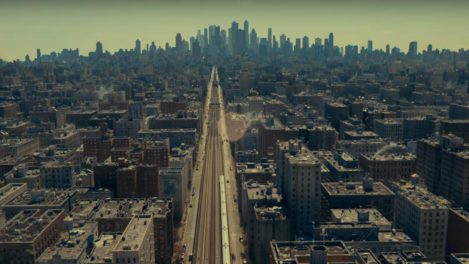
Gotham City from Joker (2019) a sprawling concrete prison for Fleck but a playground for the Joker.
Further to this the climax, an interview where Fleck has been ironically invited on to his favourite show so he can be mocked by the savvy panel is truly scintillating. A masterclass in subtlety; the temptation to give Fleck in Joker-guise a great speech is resisted and he articulates himself absolutely like a man facing down disapproval and humiliation, harangued and slighted while putting on a brave face.
The film is an incredible achievement both in its obverse reversal of the DC mythos which sees the Wayne family as remote and at best indifferent to the suffering of the masses, as well as Director Todd Phillips framing of Arthur Fleck
The impact here is of course the acting but also the ways this recalls many reality television controversies; we have, after all seen programs pulled because of suicides directly linked to guests treatment and violent murder as a result of pranks that have gone wrong, think also of the way millionaires inured in the media spotlight laugh at poor fools in the opening rounds of talent shows and we can get a sense of the discomfort of having this all reflected back to us.
That scene is one of the most real and shocking moments of cinema that I can recall in a main stream film for many years, it directly attacks pop culture programming and entertainment and resulted in an audible gasp in the cinema I was in.
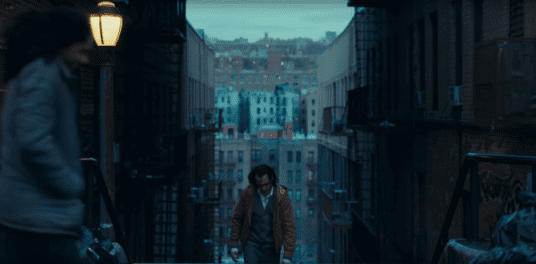
Arthur Fleck, the city rises up and closes in all around him (YouTube still)
Key Criticisms
Its important before proceeding to address a criticism, justified, but badly exaggerated by the tabloids; the alleged payment of royalties to Gary Glitter (ex musician and convicted paedophile) because of his part in the creation of 1972 track Rock and Roll Part 2. The Sun (see has drawn attention to this bad decision by the Joker producers, but true to form they hyperbole the sum and the headlines would make it seem its peculiar to the Joker film. That aside the decision to use two minutes of the song is a needless detraction from the film and a tasteless reward to a dangerous man. To bring balance to this we can look to Eamonn Forde (article here)
‘The financials are more convoluted than the red-top headlines suggest, but they are nothing compared with the ethical conundrum. “It’s really the job of the music supervisor to do the due diligence on it,” says Cliff Fluet, a partner at the law firm Lewis Silkin. “In the US, they would literally have no idea, or indeed care, about Gary Glitter.” The song has different contextual associations in the US, having long been used in sports games, [known colloquially as The “Hey!” Song due to its chant] to gee up spectators. It is far removed from its association in the UK with a convicted paedophile.’ Forde (2019)

An excellent scene but marred by a Glitter-reference, You Tube still 2019.
Forde goes on to make the point that Phil Spector (a murderer) still receives royalties for River Deep Mountain High while pointing out the regular use of the same tune in ‘sports games’ he informs us that Glitter also receives payment when Hello by Oasis plays.
We can assume then that this was either a cynical calculation because the tune worked well in the scene or an foolish oversight, either way I am going to assume that the film and those involved in it were not interested in helping Glitter or hurting his victims. The intervention though in the red tops does draw attention to the use of convicted criminals work and there is surely grounds to have the law around this issue changed. Personally I would have just not used it, especially given Fleck is an abuse survivor.
Can We Really Say Joker is Inciting Violence?
Alternatively it’s also important to address one of the unfair criticisms haunting the film; the outright insanity of gleefully waiting to blame Joker for the next mass shooting, the next wave of suicides or the next nihilistic riot. Joker is about these things not the cause of these things, so if a group of deluded thugs put on green wigs to romanticise their violence (at the time of writing this, this has not happened) do we look to films such as Joker as the root cause?
“You don’t listen, do you? You just ask the same questions every week. “How’s your job?” “Are you having any negative thoughts?” All I have are negative thoughts.”
There have been 334 mass shootings in the United States (observing the extended definition where several people are wounded or killed) in 2019 alone and numerous murders in the UK have occurred due to the much reported knife crime epidemic.
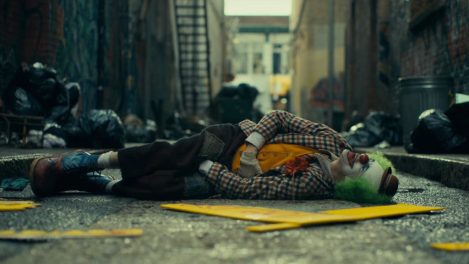
Fleck after the attack by teenagers, ‘they were just kids’ he states later, ‘I should have left it alone’ (YouTube still)
We have seen riots directly related to government policy in Paris as well as those which seemingly sparked by police brutality culminated in violent trashing and raiding of consumer stores (Tottenham riots). Suicide which is alluded to throughout the film is now the biggest killer of young men specifically in the UK.
“For my whole life, I didn’t know if I even really existed. But I do, and people are starting to notice.”
With this in mind can we please recognise the total stupidity of conflating the film with the systemic and normalised forces which act on the general public or else you will have to somehow find a way to retroactively blame Joker and film, or art in general for all of the above!
The Best Film of 2019
This review then at the outset would assert that the film is an incredible achievement both in its obverse reversal of the DC mythos which sees the Wayne family as remote and at best indifferent to the suffering of the masses, as well as Director Todd Phillips framing of Arthur Fleck (his world and its devastating parallels to our own).

Wounded and Intense the Joker externalises his pain (YouTube still).
The script co-written by Phillips and Scott Silver is masterfully rendered, Fleck’s conversations are always somewhat frustrated (not listened to, interrupted or ignored and most tragically occasionally directed at no one at all) which builds the tension alongside the melodic and forceful background instrumentals that seem to weigh down on him as he travels between work and home, home and therapy. It isn’t overlong (122 minutes) and the visual texture enhanced by cinematographer Lawrence Sher is at once sumptuous; recalling 1970s glamour while also stark, grey and oppressive situating it squarely in Reagan/Thatcher era strife.
“Can you introduce me as Joker?”
Black bags full of rubbish pile up around the inhabitants due to striking workers and general dissatisfaction with a political elite who in the form of Thomas Wayne (Batman’s father) the business man turned would-be politician, dismisses their suffering on television as evidence of their natural qualities; they are lazy, they are clowns. Who begot who is in contention here (did the Joker make Batman, did the Wayne’s make the Joker).
The Rich are Remote and Uncaring
It may be that Wayne’s portrayal is actually behind some of the condemnation the film is receiving, he is a rich man who gives to charity and has a respectful visage while also glibly expressing concern for the murdered city workers ‘Wall Street Guys’ as the film polemically refers to them and treating Fleck and his mother (a former employee) with utter disdain.
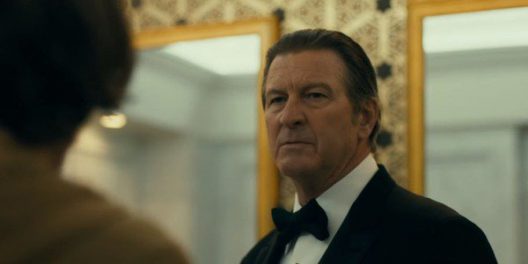
Fleck confronts Thomas Wayne about his mother and receives a blow to the face.
Wayne’s pompous and macho sense of entitlement is a nod to politicians and big business who believe their own hype, that their wealth is in no way due to luck, circumstance or inherited power but is actually directly related to their inert superiority, you get what you deserve is a motif repeated throughout the film which satirises the American dream, this becomes the horror of the climax where Joker’s suicidal aggressivity is directed, after much harrying, against De Niro’s slick and duplicitous talk show host.
The Curse of Collective Responsibility
Why this isn’t the comfortable Trump or Boris bashing that we might think liberal critics would cheer for is because the film also implicates intellectual apologists (a Dr berates Fleck for starting a seemingly tasteless joke because it may cause offence while being happy moments earlier to go along with the baying audience insinuating that Fleck might have sexual problems).
Further to this bureaucratic (middle-class indifference) is represented by Wayne’s butler who cruelly dismisses Fleck from behind the iron gates to Wayne’s mansion while the bored social worker who perfunctorily meets with Fleck weekly is po-faced and doesn’t really listen to him.
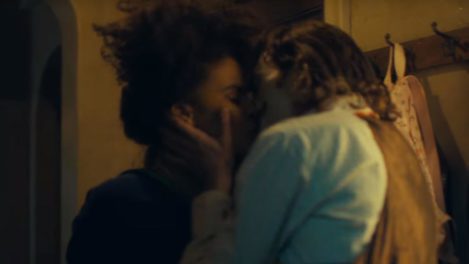
Fleck and Dumond offer each other brief respite in a word defined by pain and compromise (YouTube still)
It’s not only the top and the middle income though who come in for criticism, we see through Fleck’s co-workers and his initial assailants (a group of teenage thugs) that Joker also directs criticism at the workers and the poor, where is the camaraderie? Where is the kindness? We might ask the mother on the bus who shouts Fleck down for making her child laugh.
So we have a thoroughly uncomfortable experience for anyone who wants to believe that all is well and for those, and I’m thinking here of the chattering classes who are comfortable blaming others when it isn’t going so well, smell yourself it seems to say and there can be no doubt that we are all implicated.
Can Violence be any More Glamorized?
There is a question of glamorising violence and it’s true that the scenes in which people are killed are impactful and affecting, that’s a great feat don’t you think? In a film context where sometimes hundreds of faceless people are killed for entertainment.
In Joker every death counts, you feel them all and there are relatively few by comparison to other films: 3 on the subway, 1 in Flecks apartment 1 in the hospital and the Police kill a rioter accidentally while chasing Fleck, while a rioter kills Thomas Wayne and his wife. That makes 8 followed by the culminating and most shocking at the close of the movie, so 9 deaths in total maybe 10 (it’s unclear if Fleck has killed his interviewer in the final scene but its implied).
“I used to think that my life was a tragedy, but now I realize, it’s a comedy.”
These 9 deaths to my mind were disturbing and Fleck responsible for 5/6 lacks agency, one of the key differences of the portrayal by Heath Ledger’s Joker is the idea of agency, Ledger’s Joker has it, he is in control, an expert at planning and at improvisation he directs things and intervenes purposefully. By comparison Joaquin Phoenix’s Joker is reacting, pressured and often inarticulate; there are no great one liners, the argument at the end of the film is not triumphant but desperate.
Phoenix’s Joker is no superman or ubermench he is a tragic figure bristling with the pain inflicted by a laughing, jeering mob. In each instance his aggression represents letting go of what he actually wants to achieve, to ‘spread happiness and joy’, this naïve motivation meets the cynical grind of the media bear pit and is part of why he’s mocked in the first place.
Piteous & Sympathetic
Further to this we might look to the figure of Fleck himself, he is a malnourished and fractured man, largely friendless and terribly put upon, when he assumes the guise of Joker it’s as an appropriation of Murray Franklin’s (De Niro’s) wounding insult which robs him of the escapism that the show had offered him; Fleck is hardly a figure of aspiration.
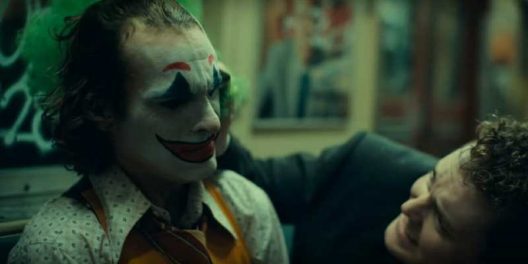
The uncomfortable encounter on the subway (You Tube Screen Shot 2019)
The second attack on Fleck is also at the centre of concerns and disapproval. It’s worth considering it in the context of other films; It shows us three men, suited, who are later described as Wall street guys, they work for Thomas Wayne.
Upon entering the subway they first concentrate their attention on a young woman who attempts to ignore their misogynistic jeering and insults, this prompts them to throw some of their food at her and Fleck, in full clown make up nervously laughs (a result of a head injury obtained in childhood) this draws their attention and as the woman rushes away they mock, then attack Fleck who is beaten to the ground.
In the struggle he draws the gun that has been foisted on him by a co-worker and shoots two of the three dead, pursuing his last attacker off the train and killing him as he tries to escape.
Contextual Resonances
Mark Kermode has made links with Taxi Driver (1976) and Death Wish (1974) but again here he is only partly right, both Kermode’s examples include intent from the protagonist and both entail planning and premeditation in the violence that proceeds. Travis Bickle trains ceaselessly and obsesses about the city he lives in, planning and finally attacking the pimp who is exploiting a young girl he pities.
Paul Kersey of Death Wish is a liberal architect who is prompted to take revenge by the killing of his wife and rape of his daughter; he goes to Texas to train, and eschew his liberality before planning, practising and finally taking his revenge on street thugs (aided by a policeman).
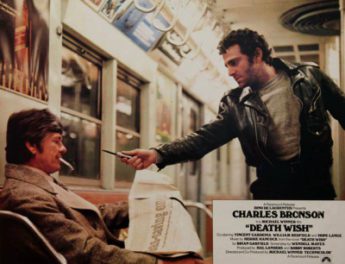
Charles Bronson’s Kersey is an ex soldier, architect and middle-class father, a very different motivation. Death Wish gave body to the fears of the rich.
Here Fleck is entirely different apart from his targets being diametrically opposite to Bickle’s and Kersey’s he does not plan anything, or pursue anything. Fleck gets no distance from the events that assail him. Fleck reacts, responds to: the attacks, to the truth (his mother’s neglect and lies), to the visit from co-workers which is actually an attempt by the man who gave him the gun to ascertain if he has been implicated by Fleck. Finally he responds to the sour request for him to be on the Murray Franklin Show where he acts out his own suicide in preparation.
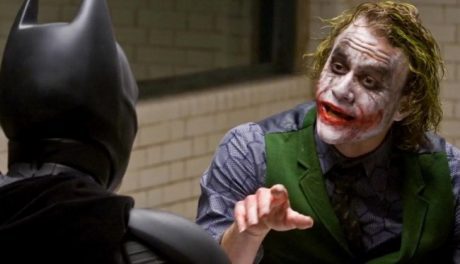
Ledger’s Joker challenges Batman’s ideology, is in control and demonstrates agency; by comparison Fleck is a victim of forces he cant control.
Building on Potential
These comparisons are less useful than seeing the way that Joker realises the potential opened up by Ledger’s portrayal of the Joker in the Dark Knight by problematizing the concept of revenge as it’s understood by characters like Bruce Wayne (or Paul Kersey) by extension the audience. The idea that a multi-millionaire in service to law and order (but more violent than the police are allowed to be) is justified in meeting out punishments on criminals was questioned in the Dark Knight by Ledger’s intellectual Joker.
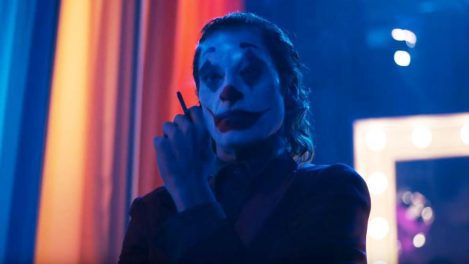
Backstage at Murray Franklin’s show Joker ponders which Joke to tell, ‘Knock Knock’ or ‘What do you get if…'(YouTube still)
In Joker the terms are totally reversed and the monster of the Joker is something closer to Marc Rocco’s, Murder in the First (1995) where a small time petty criminal played by Kevin Bacon is driven insane by the harsh conditions of Alcatraz, resulting in a violent outburst and murder.
Lack of agency makes a person vulnerable to dehumanisation and its total vanity to fantasise that we might resist that. The implication then is that Gotham is like an Alcatraz with its institutionalised (well adjusted) inmates, its guards and its would-be warden Thomas Wayne. By extension we are asked to think about the dehumanising aspects of our own big cities and consider, If not for the grace of god go I.
Core Tension
The main contention of Joker as I see it then is that society (we collectively) can take a vulnerable and naïve man down on his luck and under intense pressure, indifference and cruelty produce a monster we then wish to disinherit as if we live in a separate reality, a meta space where the effects of our actions and opinions are entirely self-contained. Where the Fleck’s of the world come from somewhere else, invade or cities, where they are weirdo’s that we have no responsibility for and no stake in.
“My mother always tells me to smile and put on a happy face. She told me I had a purpose: to bring laughter and joy to the world.”
Director Todd Phillips admittedly does nothing to sugar coat this he can be blunt curt and unsubtle and we could say that his background images of, Kill the Rich scrawled by one of the masked rioters, and his recent statement that ‘woke culture has killed comedy’, is hardly helping to softly bring naysayers on board, but then why should he?
“Is it just me, or is it getting crazier out there?”
The horrible inequalities which the film seeks to portray are well established in reality, mental health is woefully misunderstood and neglected, there are many houses for the poor which are unfit to live in even dangerously so, low income families will frequently have to do without food to heat their homes and we have seen riots in France, London and across the so called developed world because of poverty and general dissatisfaction. While the well-to-do put this down to a lack of work ethic or sour-grapes.
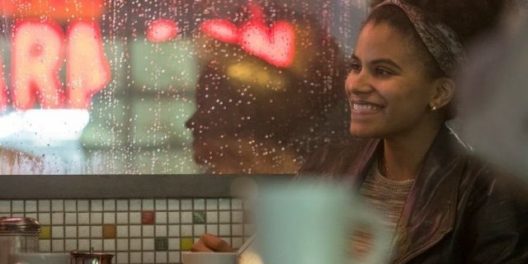
Zazie Beetz’s single mother seems to offer respite in a cruel world
Too Good to be True
There is a lovely moment where Fleck sits with Zazie Beetz as Sophie Dumond, the single mother who befriends him. They are seen from outside the diner where they are engaged in conversation fleetingly and much like an Edward Hopper painting, this is the culmination of a montage itself at the level of form considered a naïve and sentimental method of film making is perfect here to convey the couple’s activity recalling many a rom-com.
“What do you get when you cross a mentally ill loner with a society that abandons him and treats him like trash? You get what you fuckin’ deserve!”
The warm light and tiny figures are dwarfed by the city outside the café and the rising piles of rubbish remind us how these people are figured by so many, as human rubbish. A single mother and an unemployed mentally ill man; the small comfort of their friendship and potential relationship becomes all the more tragic when we realise that Fleck was only imagining her, really he was there alone, isolated and desperate, Peter Bradshaw’s ‘Pathetic loner’.
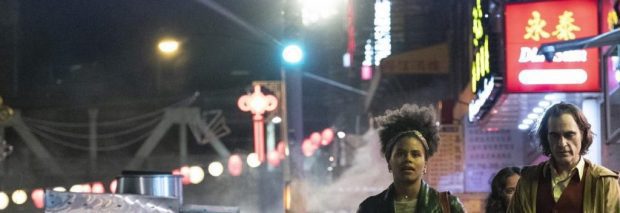

Michael Eden is an artist and researcher working in London and the south east, his artistic practice is concentrated on painting and he divides his time between this and lecturing in art history and contextual studies.

